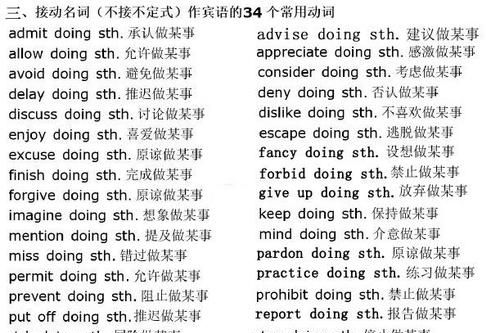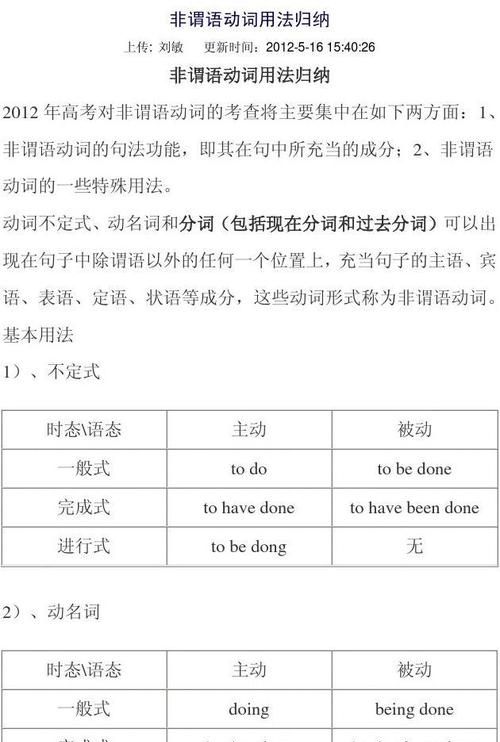本文目录
什么动词后面跟动名词
1.及物动词后跟动名词,例如:
I like dancing.(like是及物动词,dancing是动名词)
2.介词后跟动名词,例如:
I am afraid of driving in heavy traffic.(of 是介词,driving是动名词)

初中英语动词后接动名词有哪些
ving作宾语
①admit,avoid,consider,dislike,enjoy,escape,excuse,feel like,finish,forgive,give up,imagine,include,keep,mention,mind,miss,practise,put off,resist,risk,suggest,can’t help,can’t stand等动词后须用Ving形式作宾语,但不能用不定式.
②forget,go on,like,mean,regret,remember,stop,try等动词可带Ving形式或不定式作宾语,但意义上有区别.试比较:
I remember doing the exercise.我记得做过练习.I must remember to do it.我必须记着做这事.
I tried not to go there.我设法不去那里. I tried doing it again.我试着又干了一次.
Stop speaking.不要讲话.He stopped to talk.他停下来讲话.
I mean to come early today.我打算今天来早些.
Missing the train means waiting for another hour.误了这趟火车意味着再等一个小时.
③在allow,advise,forbid,permit 等动词后直接跟动词作宾语时,要用Ving形式,如果后面有名词或代词作宾语,然后在跟动词作宾语补足语时,其宾语补足语用带to的不定式.We don’t allow smoking here./We don’t allow students to smoke.
④动词need,require,want作“需要”解,其后跟动词作它的宾语时,必须用Ving形式,或不定式的被动式,这时,Ving形式的主动形式表示被动意义.例如:
The window needs (requires,wants) cleaning (to be cleaned).
.

英语动词中后面只接动名词的动词有哪些单词
跟动名词(doing)作宾语的动词:
suggest,admit,finish,avoid,mind,enjoy,delay,practice,excuse sb.
for,
advice,consider,escape,miss,risk,dislike,imagine,permit,
require(表被动),
appreciate(感激),understand,insist on,look forward to,get down to,
devote oneself to,prefer…to… object to (反对),put off,apologize to sb.
for,
give up,
forgive sb.for,be worth,be fond of,be good at,be slow in,be active
in,
be afraid of,be tired of,be busy,succeed in,
prevent/stop/keep sb.from,spend time (in),have difficult/trouble in,
It’s no use/good,
be pround of,instead of.

哪些动词后面可跟动名词做宾语补足语
后面必须跟动名词 :
admit, abhor, acknowledge, advise, advocate, avoid, confess, consider, contemplate, defer, delay, deny, discontinue, excuse, evade, fancy, finish, imagine, include, involve, justify, keep(on), mind, necessitate, pardon, postpone, practise, renounce, resent, facilitate, favor, miss, resist
后面可跟动名词也可以跟不定式:
1) 意义区别不大。
He began learning (to learn) English at the age of five. 常见的动词有:start, like, hate, love, continue, prefer, commence, attempt, intend, propose, decline, endure, neglect, omit, recollect, recall, bear.
2) 意义有区别
a) remember doing sth 记住做过某事。remember to do sth 记住要做某事。
b) forget doing sth 忘记做过某事。forget to do sth 记住要做某事。
c) regret doing sth 遗憾做过某事。regret to do sth 遗憾要做某事。
d) try doing sth 试着做某事。try to do sth 努力做某事。
e) mean doing sth 意旨做某事。mean to do sth 打算做某事。
f) stop doing sth 停止做某事。stop to do sth 停下来做某事。
g) can't help doing sth 忍不住做某事。 can't help to do sth 不能帮做某事。
h) go on doing sth 继续做某事。 go on to do sth 接着做另一事。
动名词的逻辑主语有时同谓语动词的主语不一致时:
Do you mind my opening the window?

以上就是关于常跟动名词的动词 ,什么动词后面跟动名词的全部内容,以及常跟动名词的动词 的相关内容,希望能够帮到您。

